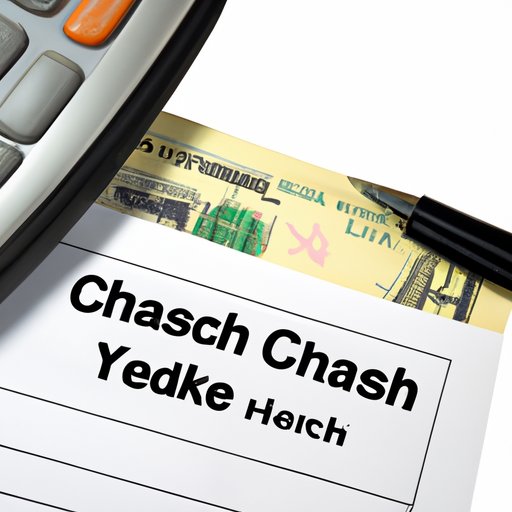
I. Introduction
For many people, checks are an important source of income. Whether it’s a paycheck from an employer or a payment from a client, checks can provide a sense of security and stability. However, many people struggle with the question of how long they can wait to cash a check before it becomes invalid. This article will explore the legal framework of check cashing and provide tips for maximizing your earning potential by understanding check cashing deadlines.
II. A complete guide to understanding the check cashing process and its legal framework: How long can you wait to cash a check?
Check cashing is the process of converting a check into cash. The legal framework that governs check cashing is based on the Uniform Commercial Code (UCC) and state laws. The UCC provides rules for the transfer of negotiable instruments, such as checks, between parties.
One of the general rules for how long a person can wait to cash a check is the “stale date” rule. This rule states that a check is valid for up to six months after it is issued. After this date, the check becomes “stale” and may not be accepted by banks or other financial institutions.
Another rule is for post-dated checks. A post-dated check is one that is dated for a future date, often used to delay payment until a future time. However, banks are not required to honor post-dated checks and may choose to cash them immediately. Therefore, it’s important to have the funds available when issuing a post-dated check.
Examples of these rules and how they affect people’s ability to cash their checks include situations where a person holds onto a check for too long and it becomes stale, or when a post-dated check is cashed before the intended date, causing financial problems for the issuer.
III. Don’t leave money on the table: A closer look at check expiration dates and their impact on your finances
Check expiration dates are determined by the bank that issued the check or the person who wrote the check. An expiration date may be included on the check, or the bank may have a policy that assigns a specific timeframe for cashing a check.
The expiration date can impact a person’s finances as they may lose funds if the check is not cashed in time. Additionally, many banks charge fees for issuing a replacement check, which may reduce the amount of money a person receives.
To avoid losing funds or incurring fees, it’s essential to cash checks promptly. This can be done by keeping track of the expiration date and ensuring that the check is cashed before the expiration date occurs. Further, it’s essential to review the bank’s policies regarding check expiration dates to ensure that funds are not lost.
IV. The dos and don’ts of check cashing: How to avoid common mistakes when waiting to cash a check
There are several common mistakes people make when it comes to check cashing. One of these is waiting too long to cash a check, which can lead to the check becoming stale and unserviceable. Another mistake is accepting a check that is not valid, such as one with incorrect information or signature.
To avoid these mistakes, it’s important to carefully review each check for accuracy and legitimacy. This includes verifying that the check is signed correctly, that the amount is correct, and that there are no other errors or discrepancies. Additionally, it’s essential to understand the rules surrounding check cashing deadlines and expiration dates, to maximize your earning potential.
V. What to do if your check has expired: A step-by-step guide to reclaiming your funds
If a check has expired, there are several steps people can take to reclaim their funds. The first step is to contact the issuer of the check and ask for a replacement check. The issuer may agree to reissue the check, or they may refuse. In some cases, the bank that issued the check may also be able to reissue the funds.
There may be fees associated with reissuing a check, which can reduce the total amount of funds a person receives. However, it’s still essential to take action promptly to avoid losing funds entirely.
VI. Maximizing your earning potential by understanding check cashing deadlines: How long is too long to wait to cash a check?
The length of time a person waits to cash a check can impact their earning potential. For example, if a person waits too long to cash a check, they may miss out on the opportunity to earn interest on the funds. Additionally, some financial institutions charge fees for processing checks that have been held for an extended period.
To maximize your earning potential, it’s essential to understand check cashing deadlines and cash your checks promptly. This means reviewing each check for accuracy and legitimacy, tracking expiration dates, and taking action to cash your checks as soon as possible.
VII. Conclusion
Checks are a valuable source of income for many people. However, it’s essential to understand the legal framework that governs check cashing and the rules surrounding check expiration dates and cashing deadlines. Taking action to cash your checks promptly can help maximize your earning potential and avoid financial losses.
Remember, avoiding common mistakes, such as waiting too long to cash a check or accepting a check that is not valid, can help you get the most out of your checks.





